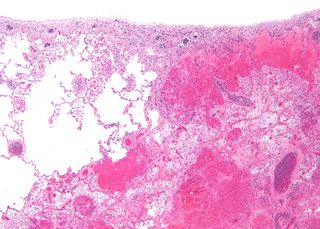Gonadectomy, the removal of the gonads, may refer to:
- Orchiectomy, removal of the testicles
- Castration, removal of the use of the testicles, including by chemical means
- Oophorectomy, removal of the ovaries
Gonadectomy, the removal of the gonads, may refer to:
Nut often refers to:

A testicle or testis is the male gonad in all bilaterians, including humans. It is homologous to the female ovary. The functions of the testicles are to produce both sperm and androgens, primarily testosterone. Testosterone release is controlled by the anterior pituitary luteinizing hormone, whereas sperm production is controlled both by the anterior pituitary follicle-stimulating hormone and gonadal testosterone.
Nard may refer to:

Testicular torsion occurs when the spermatic cord twists, cutting off the blood supply to the testicle. The most common symptom in children is sudden, severe testicular pain. The testicle may be higher than usual in the scrotum and vomiting may occur. In newborns, pain is often absent and instead the scrotum may become discolored or the testicle may disappear from its usual place.

Testicular cancer is cancer that develops in the testicles, a part of the male reproductive system. Symptoms may include a lump in the testicle or swelling or pain in the scrotum. Treatment may result in infertility.

Rocky Mountain oysters or mountain oysters, or meat balls, also known as prairie oysters in Canada, is a dish made of bull testicles. The organs are often deep-fried after being skinned, coated in flour, pepper and salt, and sometimes pounded flat. The dish is most often served as an appetizer.

Epididymitis is a medical condition characterized by inflammation of the epididymis, a curved structure at the back of the testicle. Onset of pain is typically over a day or two. The pain may improve with raising the testicle. Other symptoms may include swelling of the testicle, burning with urination, or frequent urination. Inflammation of the testicle is commonly also present.

Infarction is tissue death (necrosis) due to inadequate blood supply to the affected area. It may be caused by artery blockages, rupture, mechanical compression, or vasoconstriction. The resulting lesion is referred to as an infarct (from the Latin infarctus, "stuffed into").

Cock and ball torture (CBT) is a sexual activity involving the application of pain or constriction to the male genitals. This may involve directly painful activities, such as genital piercing, wax play, genital spanking, squeezing, ball-busting, genital flogging, urethral play, tickle torture, erotic electrostimulation, kneeing or kicking. The recipient of such activities may receive direct physical pleasure via masochism, or emotional pleasure through erotic humiliation, or knowledge that the play is pleasing to a sadistic dominant. Many of these practices carry significant health risks.
Tunica albuginea may refer to:

A seminoma is a germ cell tumor of the testicle or, more rarely, the mediastinum or other extra-gonadal locations. It is a malignant neoplasm and is one of the most treatable and curable cancers, with a survival rate above 95% if discovered in early stages.
Clackers were 1970s toys.
The ICD-10 Procedure Coding System (ICD-10-PCS) is a US system of medical classification used for procedural coding. The Centers for Medicare and Medicaid Services, the agency responsible for maintaining the inpatient procedure code set in the U.S., contracted with 3M Health Information Systems in 1995 to design and then develop a procedure classification system to replace Volume 3 of ICD-9-CM. ICD-9-CM contains a procedure classification; ICD-10-CM does not. ICD-10-PCS is the result. ICD-10-PCS was initially released in 1998. It has been updated annually since that time. Despite being named after the WHO's International Classification of Diseases, it is a US-developed standard which is not used outside the United States.

The testicles of calves, lambs, roosters, turkeys, and other animals are eaten in many parts of the world, often under euphemistic culinary names. Testicles are a by-product of the castration of young animals raised for meat, so they were originally a late-spring seasonal specialty, though nowadays they are generally available year-round.
Penis removal is the act of removing the human penis. It is not to be confused with the related practice of castration, in which the testicles are removed or deactivated, or emasculation, which removes both. Penis removal and castration have been used to create a class of servants or slaves called eunuchs in many different places and eras, having a notable presence in various societies such as Imperial China.
Sack tapping is a slang term for a game where a participant attacks, by slapping, tapping, punching, kicking, elbowing, twisting, or backhanding a victim's testicles. The term derived from 'sack', slang that refers to the scrotum, and the activity is a form of groin attack. This sociological manifestation of bullying can result in severe testicular injury that may require amputation as the only form of treatment. A reported increased popularity of sack tapping, fueled in part by YouTube videos, and the subsequent increase in hospitalization has concerned parents and urologists. It is also called "nut tag", "bag tag", "sack whack", "bell flicking" and "roshambo", the last name coming from an episode of South Park that featured the practice.
"Deez nuts" or deez nutz is a euphemism and slang term for testicles.
Monkey gland may refer to surgeon Serge Voronoff's 1920s technique of grafting monkey testicle tissue on to the testicles of men for purportedly therapeutic purposes. It may also refer to:

Dora Rudolfine Richter was a German trans woman and the first known person to undergo complete male-to-female gender-affirming surgery. She was one of a number of transgender people in the care of sex-research pioneer Magnus Hirschfeld at Berlin's Institute for Sexual Research during the 1920s and early 1930s. She underwent surgical removal of the testicles in 1922, followed in 1931 by removal of the penis and vaginoplasty. Richter died at the age of 74 in Allersberg, Bavaria on 26 April 1966.